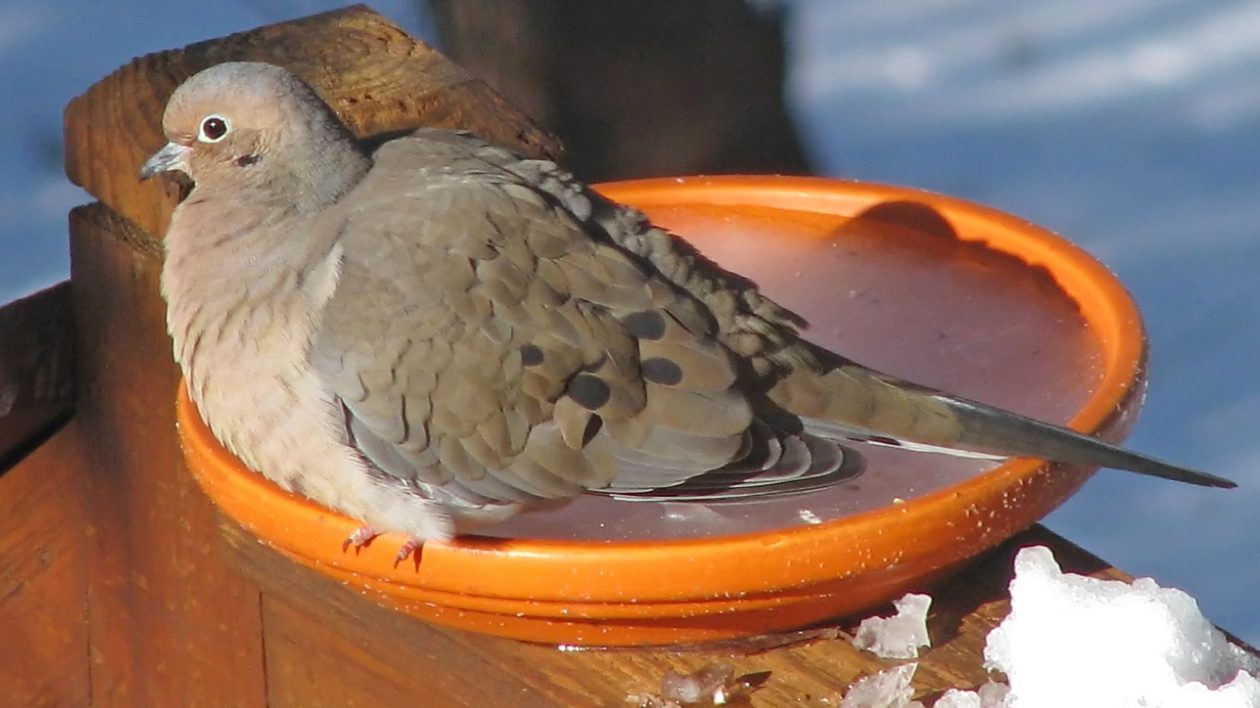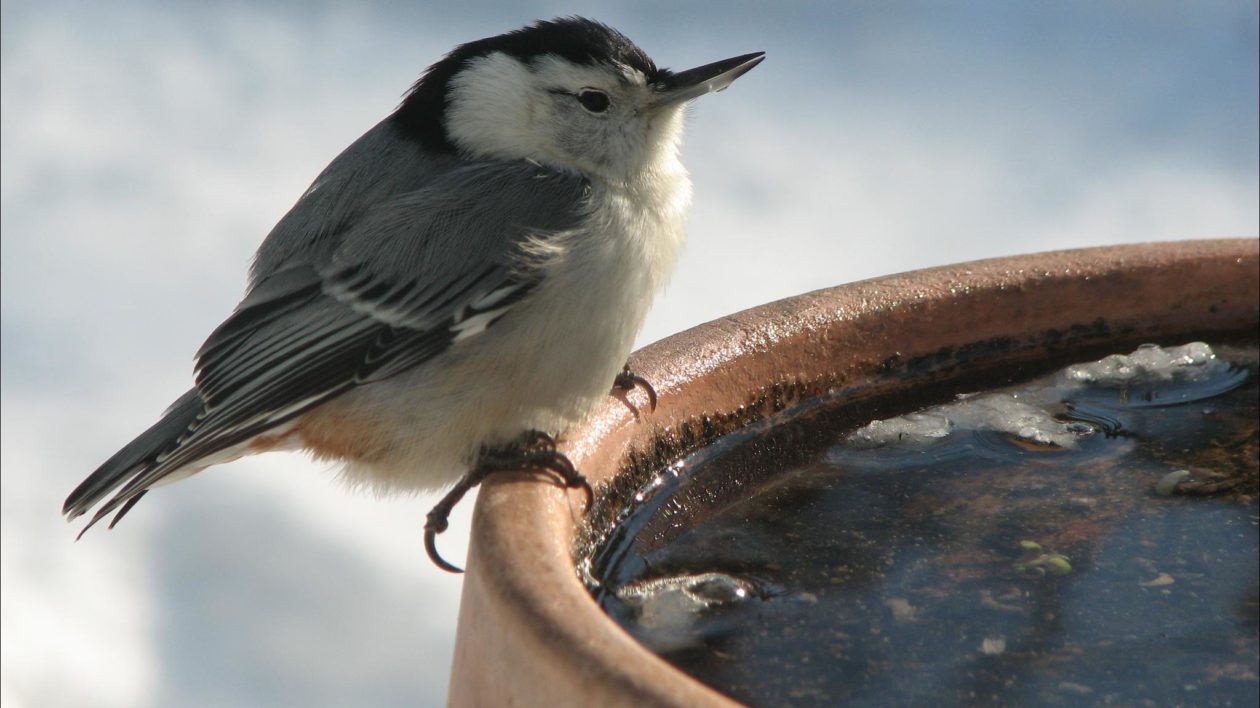Throughout the summer months, we supply birds with water, which they use for drinking, bathing, or simply cooling off.
As winter approaches, we prepare by covering or putting away our birdbaths and other water features, therefore assuming that birds will not need them until next spring.
If water is frozen, it will cost birds a lot of body heat to melt. Therefore, what are some other ways birds themselves get water during the winter? Adult birds who primarily feed on seed are able to produce water internally through the process of cellular respiration. Water serves as a by-product, which is the breakdown of carbohydrates, fats, and proteins.
Additionally, adults will consume insects, which contain water. They will also feed insects to their chicks, which allows them to get water as well.
As a last resort, birds can get water from snow; however, melting snow inside the body uses energy. Birds can also get water from dripping icicles. If birds do manage to find a source of unfrozen water, they will gather in large groups and drink.
Safe Ways We Can Provide Water
Thankfully, there are alternative secure methods by which we can give birds water. One method is to put out an unbreakable shallow bowl of water and then bring it back in once the ice forms. Birds will find your bowl more quickly if you leave it out every day at the same time.
Returning to the heated birdbaths, we can use them to let birds drink from them instead of bathing in them if we use them properly.
If you decide to use a heated birdbath, recommendations include obtaining a nonmetallic grille or finding another effective method of very slightly covering the bath.
Tips from the National Wildlife Federation even suggest that you can place some dark stones (this helps to absorb heat) at the bottom and some sticks on top to encourage perching. The goal is to allow birds enough room to insert their bills for drinking without being able to submerge themselves into the water.
Furthermore, think about installing an immersion-style water heater if you are currently using a heater in your birdbath to prevent the water from freezing.
Lastly, refrain from putting substances in the water that function as antifreeze, like glycerin. This mixture can cause birds’ blood sugar levels to rise and even mat their feathers, which reduces their insulation value.

A Dangerous Winter Bath
According to an article by Pennington, bathing for birds in the winter can be dangerous. Puddles will tend to melt only when the temperature is high enough, and water on feathers wont freeze before the birds have a chance to shake it off.
Having water like this available for birds to bathe in is something that many bird advocates may decide to buy heated birdbaths. However, heated birdbaths should be used a certain way. Birds’ feathers may become frozen when they take a heated bath in a birdbath on a chilly day.
In fact, there are documented records of starlings dropping from the sky seconds after taking off from heated birdbaths, and wet mourning dove tails freezing to branches as the water from a bath freezes. There was even an instance reported in Star Tribune where an avid bird watcher, Tami Vogel, reported recovering six cardinals in her yard unable to fly because their feathers had frozen and they literally could not extend their wings.
The important thing is to be able to adjust your heated birdbath so that birds can safely drink rather than bathe.

It’s possible that some of you lack access to an outside electrical outlet. If so, you can still supply water by setting up big saucerspossibly planter basesin sunny spots and adding water to them a few times a day. You can use cold water instead of hot since the latter freezes more quickly. Many people believe that birds shouldn’t have to worry about eating snow, but doing so requires energy that birds need to stay warm. Bathing is important in the winter. Birds will bath as a way to preen their feathers. This helps their feathers stay positioned which avoids gaps. Feather gaps can cause a loss of body heat.
We offer many different models of heated birdbaths including deck mount, ground mount, and free standing. If cats frequent your yard, a ground mount style is not the one for you. You will need an outdoor extension cord to run to your power outlet. A Cord Connect can be used to lock the cords together and keep the connection dry. If you would like to provide water for your birds this winter, please come and visit one of our store locations, wed be happy to help you!
Now is a good time to consider how you will supply your backyard’s feathered friends with water during the impending cold winter months. Since many natural sources, such as ponds and streams, freeze in the winter, it becomes extremely difficult for birds to find open water for drinking and bathing.
It’s a terrific idea to upgrade your yard with a heated birdbath. Consider installing a birdbath heater if you already have a birdbath that you can leave outside throughout the winter. While heated birdbaths and birdbath heaters prevent the water from freezing, they do not actually heat the water. The birdbath’s interior edges may start to form ice when the temperature falls below -23 degrees Celsius, but the center should still have open water. Additionally, water in heated birdbaths will evaporate more quickly, so watch it closely. To refill mine, I keep a two-liter soda bottle by the back door. Your birdbath will attract more birds if you place it in a pleasant, sunny spot. If you think your birdbath is too deep, you can add some stones to the basin so the birds can still get a drink without having to submerge themselves. Maintaining the cleanliness of the birdbath is also essential to the health of our feathered friends.
In the upcoming months, you will be able to witness various methods that birds use to stay warm. It’s possible to witness birds sunbathing by facing away from the sun. This warms their feathers and heats their bodies. Birds often look fatter in the winter. Feather fluffing is what causes this. Puffing out down feathers creates air pockets that help retain body heat. Additionally, birds will tuck their bills into their shoulders or tuck one leg close to their body.
FAQ
Should you give your bird cold water?
Do birds like cold or warm water to drink in winter?
Can you put ice in birds water?